Related Research Articles

Joseph Priestley was an English chemist, natural philosopher, separatist theologian, grammarian, multi-subject educator, and liberal political theorist. He published over 150 works, and conducted experiments in electricity and other areas of science. He was a close friend of, and worked in close association with Benjamin Franklin involving electricity experiments.

Gordon Earle Moore was an American businessman, engineer, and the co-founder and emeritus chairman of Intel Corporation. He proposed Moore's law which makes the observation that the number of transistors in an integrated circuit (IC) doubles about every two years.

Jacqueline K. Barton, is an American chemist. She worked as a Professor of Chemistry at Hunter College (1980–82), and at Columbia University (1983–89) before joining the California Institute of Technology. In 1997 she became the Arthur and Marian Hanisch Memorial Professor of Chemistry and from 2009 to 2019, the Norman Davidson Leadership Chair of the Division of Chemistry and Chemical Engineering at Caltech. She currently is the John G. Kirkwood and Arthur A. Noyes Professor of Chemistry.
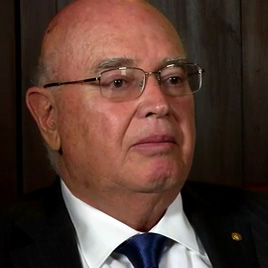
Gabor A. Somorjai is a professor of chemistry at the University of California, Berkeley, and is a leading researcher in the field of surface chemistry and catalysis, especially the catalytic effects of metal surfaces on gas-phase reactions. For his contributions to the field, Somorjai won the Wolf Prize in Chemistry in 1998, the Linus Pauling Award in 2000, the National Medal of Science in 2002, the Priestley Medal in 2008, the 2010 BBVA Foundation Frontiers of Knowledge Award in Basic Science and the NAS Award in Chemical Sciences in 2013. In April 2015, Somorjai was awarded the American Chemical Society's William H. Nichols Medal.

Robert Geoffrey William Anderson, is a British museum curator and historian of chemistry. He has wide-ranging interests in the history of chemistry, including the history of scientific instrumentation, the work of Joseph Black and Joseph Priestley, the history of museums, and the involvement of the working class in material culture. He has been Director of the Science Museum, London, the National Museums of Scotland, the British Museum, London, and president and CEO of the Chemical Heritage Foundation in Philadelphia.

Richard Neil Zare is the Marguerite Blake Wilbur Professor in Natural Science and a Professor of Chemistry at Stanford University. Throughout his career, Zare has made a considerable impact in physical chemistry and analytical chemistry, particularly through the development of laser-induced fluorescence (LIF) and the study of chemical reactions at the molecular and nanoscale level. LIF is an extremely sensitive technique with applications ranging from analytical chemistry and molecular biology to astrophysics. One of its applications was the sequencing of the human genome.

Michael Cyril William Hunter is emeritus professor of history in the department of history, classics and archaeology and a fellow of Birkbeck, University of London. Hunter is interested in the culture of early modern England. He specialises in the history of science in seventeenth- and early eighteenth-century England, particularly the work of Robert Boyle. In Noel Malcolm's judgement, Hunter "has done more for Boyle studies than anyone before him ".

George McClelland Whitesides is an American chemist and professor of chemistry at Harvard University. He is best known for his work in the areas of nuclear magnetic resonance spectroscopy, organometallic chemistry, molecular self-assembly, soft lithography, microfabrication, microfluidics, and nanotechnology. A prolific author and patent holder who has received many awards, he received the highest Hirsch index rating of all living chemists in 2011.

This timeline of chemistry lists important works, discoveries, ideas, inventions, and experiments that significantly changed humanity's understanding of the modern science known as chemistry, defined as the scientific study of the composition of matter and of its interactions.

Peter B. Dervan is the Bren Professor of Chemistry at the California Institute of Technology. The primary focus of his research is the development and study of small organic molecules that can sequence-specifically recognize DNA, a field in which he is an internationally recognized authority. The most important of these small molecules are pyrrole–imidazole polyamides. Dervan is credited with influencing "the course of research in organic chemistry through his studies at the interface of chemistry and biology" as a result of his work on "the chemical principles involved in sequence-specific recognition of double helical DNA". He is the recipient of many awards, including the National Medal of Science (2006).
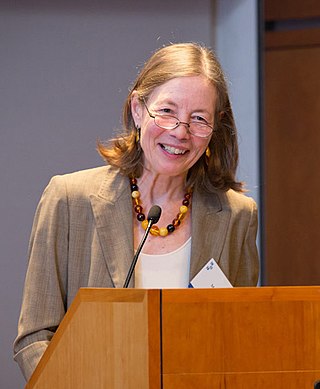
Mary Jo Nye is an American historian of science and Horning Professor in the Humanities emerita of the History Department at Oregon State University. She is known for her work on the relationships between scientific discovery and social and political phenomena.
Paul S. Anderson is an American chemist. He worked at Merck, DuPont-Merck, and Bristol-Myers Squibb.
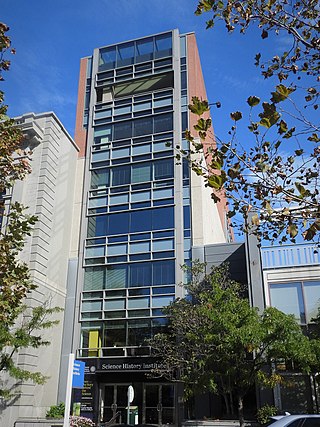
The Science History Institute is an institution that preserves and promotes understanding of the history of science. Located in Philadelphia, Pennsylvania, it includes a library, museum, archive, research center and conference center.

Peter John Stang is a German American chemist and Distinguished Professor of chemistry at the University of Utah. He was the editor-in-chief of the Journal of the American Chemical Society from 2002 to 2020.
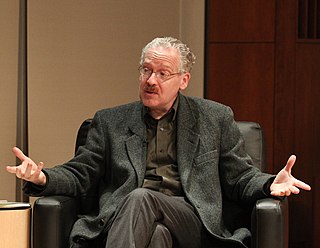
Lawrence M. Principe is the Drew Professor of the Humanities at Johns Hopkins University in the Department of History of Science and Technology and the Department of Chemistry. He is also currently the Director of the Charles Singleton Center for the Study of Premodern Europe, an interdisciplinary center for research at Johns Hopkins. He is the first recipient of the Francis Bacon Medal for significant contributions to the history of science. Principe's research has been supported by the National Science Foundation, the National Endowment for the Humanities, the American Philosophical Society, the Chemical Heritage Foundation, and a 2015-2016 Guggenheim Fellowship. Principe is recognized as one of the foremost experts on the history of alchemy.

Henry Carrington Bolton (1843–1903) was an American chemist and bibliographer of science.

William R. Newman is Distinguished Professor and Ruth N. Halls Professor in the Department of History and Philosophy of Science at Indiana University. Most of Newman’s work in the History of Science has been devoted to alchemy and "chymistry," the art-nature debate, and matter theories, particularly atomism. Newman is also General Editor of the Chymistry of Isaac Newton, an online resource combining born-digital editions of Newton’s alchemical writings with multimedia replications of Newton’s alchemical experiments. In addition, he was Director of the Catapult Center for Digital Humanities and Computational Analysis of Texts at Indiana University. Newman is on the editorial boards of Archimedes, Early Science and Medicine, and HOPOS.

John D. Baldeschwieler is an American chemist who has made significant contributions in molecular structure and spectroscopy.

Helge Stjernholm Kragh is a Danish historian of science who focuses on the development of 19th century physics, chemistry, and astronomy. His published work includes biographies of Paul Dirac, Julius Thomsen and Ludvig Lorenz, and The Oxford Handbook of the History of Modern Cosmology (2019) which he co-edited with Malcolm Longair.
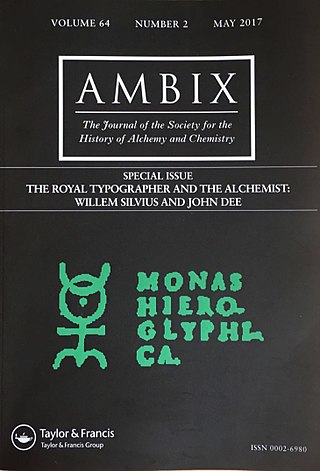
The Society for the History of Alchemy and Chemistry, founded as the Society for the Study of Alchemy and Early Chemistry in 1935, holds biennial meetings and a yearly Graduate Workshop, publishes the journal Ambix and a biennial newsletter Chemical Intelligence, and offers prizes and grants to scholars. It has a worldwide membership.
References
- 1 2 3 4 "Roy G. Neville Prize in Bibliography or Biography". Science History Institute. 5 July 2016. Retrieved 1 February 2018.
- ↑ Neville, Roy G. (2006). The Roy G. Neville Historical Chemical Library: An Annotated Catalogue of Printed Books on Alchemy. Philadelphia, Penn: Chemical Heritage Foundation. ISBN 9780941901406.
- ↑ Greenberg, Arthur (2006). From alchemy to chemistry in picture and story. Hoboken, NJ: Wiley. p. xxiii. ISBN 978-0471751540 . Retrieved 18 May 2016.
- ↑ Sanderson, Katharine (2004). "Chemical bounty in the bargain basement". Royal Society of Chemistry. Retrieved 18 May 2016.
- ↑ "Roy G. Neville Prize awarded to Helge Kragh". Niels Bohr Archive. 14 September 2019. Retrieved 16 January 2020.
- ↑ "Faculty and Staff Features for August 2017". VCU News. August 31, 2017. Retrieved 22 October 2017.
- ↑ "Professor Michael Hunter". Birkbeck University of London. Retrieved 18 May 2016.
- ↑ "Executive Committee". International Society for Intellectual History. Retrieved 28 November 2016.
- ↑ "Emeritus Professor of History of Science wins accolade International Prize for Professor Bill Brock". University of Leicester. Retrieved 18 May 2016.
- ↑ "Speaking Utopian". University of Pennsylvania. 27 February 2014. Retrieved 18 May 2016.
- ↑ "Michael Gordin". Simon Guggenheim Memorial Foundation. Retrieved 18 May 2016.
- ↑ Gussman, Neil (2006). "Biography of Joseph Priestley Receives First Neville Prize". Chemical Heritage Magazine. 24 (4): 21. Archived from the original on 2016-06-11. Retrieved 18 May 2016.
- ↑ "Robert Edwin Schofield". Institute for Advanced Study. Retrieved 18 May 2016.